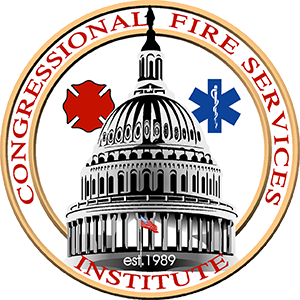As the 117th Congress came to a close, CFSI and many of our partner organizations were hard at work advocating for many legislative measures to benefit the fire and emergency services. Working together, we were able to get a number of measures signed into law and make good progress on other advocacy items.
At the end of December, Congress passed and the President signed into law the Consolidated Appropriations Act, 2023 (P.L. 117-328). Due to our efforts, the measure either maintained or increased funding for many fire service programs.
- $58.3 million for the U.S. Fire Administration (USFA). Each year, CFSI advocates for additional funding for USFA to carry out its mission. The legislation included approximately $5 million in additional funding for the agency to advance its mission in the areas of education, training, research, and data collection.
- $10.5 million for the Supporting and Improving Rural Emergency Medical Service’s Needs (SIREN) program. The program, which benefits EMS in rural areas, received an increase of approximately $3 million over prior year funding.
- $5.5 million for the National Firefighter Registry (NFR). Working with our partner organizations, CFSI helped secure an additional $3 million more than the budget request for the NFR as it moves towards open enrollment. Click here to learn more about the NFR and projected timelines for implementing the program.
- Additional $1 billion for the World Trade Center Health Program (WTCHP). CFSI worked with our partners to advocate for the increased funding for the WTCHP, which provides health benefits to 9/11 first responders and survivors. Without the additional funding, the WTCHP would have cut services and denied new enrollments.
- $2 million for carbon monoxide alarm installation and educational grants at the Consumer Product Safety Commission. CFSI and our partner organizations worked with congressional members to have these grants created through the Nicholas and Zachary Burt Memorial Carbon Monoxide Poisoning Prevention Act, which became law in March 2022. We then worked to secure funding for these grants through the appropriations process.
- $76 million for State Fire Assistance (National Fire Capacity) grants. This is an increase of $1 million over the prior year enacted level.
- $21 million for Volunteer Fire Assistance (Rural Fire Capacity) grants. This is also $1 million more than the prior year enacted level.
- $4.5 million for the Joint Fire Science program. This is an increase of $500,000 from prior year funding.
- $37.832 million for FEMA’s Urban Search and Rescue Response system. This is a slight increase from the prior year.
- $360 million for the Assistance to Firefighters Grant and for the Staffing for Adequate Fire and Emergency Response grant programs. Funded at previous-year levels, these two grant programs will ensure that opportunities remain available for local fire departments to purchase critical tools and training and staff their stations in order to continue protecting their communities
- $65 million for Housing Health Hazard grants. These grants are used for renovations of HUD properties that include the installation of fire sprinklers.
- Extension of Medicare Ground Ambulance Add-On payments. These payments were extended to December 31, 2024.
- Excess equipment agreements pertaining to wildfire. The Consolidated Appropriations Act includes language allowing the Secretary of the Interior to enter into grants and cooperative agreements with volunteer fire departments, rural fire departments, rangeland fire protection associations, and similar organizations to provide for certain wildland fire training and equipment.
- The Public and Federally Assisted Housing Fire Safety Act of 2022 became law as part of the Consolidated Appropriations Act. This bill, introduced by Rep. Madeleine Dean (PA) in response to the deadly fire in Philadelphia in 2022, will require the installation of qualifying smoke alarms in federally-assisted housing.
Also in December, the Federal Firefighters Fairness Act (P.L.117-263) was signed into law. This bill, which was supported by CFSI, will advance federal firefighter health and safety by creating a rebuttable presumption that federal firefighters who become disabled by heart disease, lung disease, and certain cancers contracted such illnesses on the job.
Another legislative victory for the fire service was the passage of the Empowering the U.S. Fire Administration Act (P.L.117-246), which will give USFA the authority to investigate major fires. This bill, which became law on December 20, 2022, gives USFA the authority to collect important data and work with federal, state, and local partners to understand the causes of fire and take a broad look at fire and life safety.
Lastly, Congress approved the Protecting Firefighters from Adverse Substances Act or the PFAS Act (P.L.117-248). This bill authorizes DHS to develop guidance for the fire and emergency services pertaining to the health threat of PFAS and put forward a curriculum in partnership with USFA to assist in reducing PFAS exposure, preventing PFAS environmental contamination, and educating stakeholders on PFAS.
CFSI and our partner organizations spent considerable time and energy in the 117th Congress working on legislation to reauthorize the AFG and SAFER grant programs and USFA. While Congress did not ultimately pass the bill, we will resume our efforts in the 118th Congress.
2022 was a busy year for CFSI on the Hill. As always, we are grateful for the collaboration of our NAC members in our legislative work and together, we will continue to advocate for policies and legislation in the 118th Congress that will benefit the fire and emergency services.

